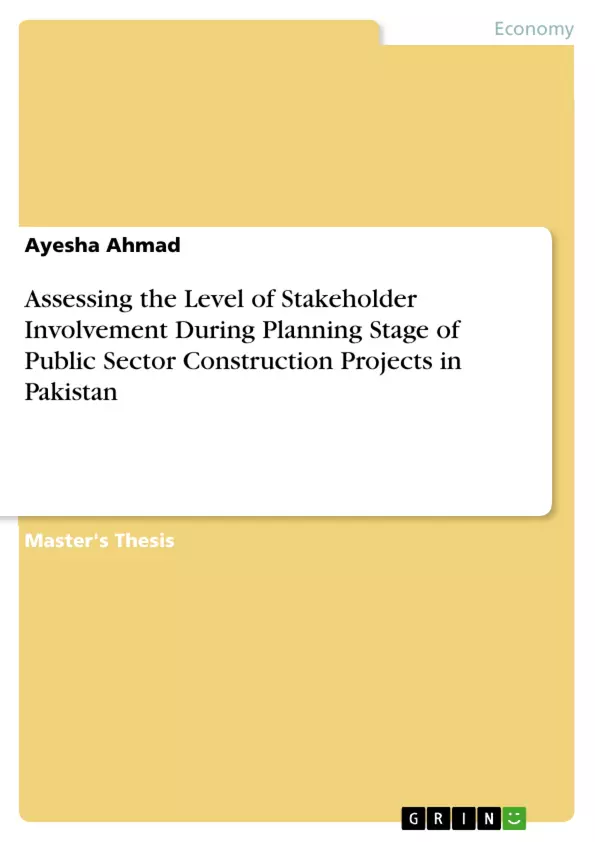Construction projects, from their early stages to the completion phases are executed through the efforts and involvement of various groups of people. These groups are referred to as the ‘project stakeholders’. For successful implementation of a construction project, stakeholder management has got a crucial role. Stakeholder management is not an easy task and it needs proper consideration for successful implementation of a construction project. Based on the observations and previous researches, a gap has been identified regarding evaluation of stakeholder involvement during planning stage of the construction projects in Pakistani Construction industry. Therefore, the current research aims at the evaluation of level of stakeholder involvement during planning stage of construction projects at Pakistan level. One of the aims of this research is also to understand the concept of the stakeholder involvement in the construction industry and for examining the ways that stakeholder engagement can be empowered appropriately and efficiently to assist in achieving the ultimate goals of the project in shape of project out comes. Through the literature major stakeholders involved in a construction project are identified as: client, project management team, consultant and design team, contractor, sub-contractor, suppliers, employees, local communities, sponsor and government authorities. The involvement level of these stakeholders has been assessed on different project planning activities. The results show that early stakeholder involvement help the organization for finding better solutions for the problems. Moreover, it helps in aligning the project goals with stakeholder expectations. In different planning activities different involvement levels of stakeholders have been identified. Project managers have the highest involvement during the planning stage and local communities have the least. It revealed that considerate attention should be given to empowering the more effective incorporation of different project members during the project planning process. Analysis of the result also confirmed the findings from the literature stating that an effective involvement of stakeholders will highly contribute to resolving, or improving several issues involved in the project early. It is therefore recommended that the project managers should adopt improved decision making strategies for effective stakeholder involvement employing the different useful technique.
Inhaltsverzeichnis (Table of Contents)
- Chapter 1: Introduction
- 1.1 Background of the Study
- 1.2 Problem Statement
- 1.3 Research Questions
- 1.4 Objectives of the Study
- 1.5 Significance of the Study
- 1.6 Scope of the Study
- 1.7 Limitations of the Study
- Chapter 2: Literature Review
- 2.1 Stakeholder Involvement in Construction Projects
- 2.2 Importance of Stakeholder Involvement
- 2.3 Benefits of Stakeholder Involvement
- 2.4 Challenges of Stakeholder Involvement
- 2.5 Frameworks for Stakeholder Involvement
- Chapter 3: Research Methodology
- 3.1 Research Design
- 3.2 Population and Sample
- 3.3 Data Collection Methods
- 3.4 Data Analysis Techniques
- Chapter 4: Data Analysis and Findings
- Chapter 5: Discussion and Recommendations
Zielsetzung und Themenschwerpunkte (Objectives and Key Themes)
This thesis aims to evaluate the level of stakeholder involvement in the planning stage of public sector construction projects in Pakistan. It investigates the factors influencing stakeholder engagement and identifies the challenges and opportunities associated with effective stakeholder participation.
- Stakeholder involvement in construction projects
- Factors influencing stakeholder engagement
- Benefits and challenges of stakeholder involvement
- Best practices for stakeholder management in public sector projects
- Recommendations for improving stakeholder engagement in Pakistan
Zusammenfassung der Kapitel (Chapter Summaries)
Chapter 1 introduces the research topic, outlining the background, problem statement, research questions, objectives, significance, scope, and limitations of the study. Chapter 2 provides a comprehensive literature review on stakeholder involvement in construction projects, exploring its importance, benefits, challenges, and existing frameworks. Chapter 3 details the research methodology, including the research design, population and sample, data collection methods, and data analysis techniques. Chapter 4 presents the data analysis and findings, exploring the level of stakeholder involvement in the planning stage of public sector construction projects in Pakistan. Chapter 5 discusses the findings and provides recommendations for improving stakeholder engagement in future projects.
Schlüsselwörter (Keywords)
Stakeholder involvement, construction projects, public sector, Pakistan, planning stage, project management, stakeholder engagement, benefits, challenges, best practices, recommendations.
Frequently Asked Questions
What is the focus of this research on Pakistani construction projects?
The thesis evaluates the level of stakeholder involvement during the planning stage of public sector construction projects in Pakistan.
Who are the main stakeholders identified in a construction project?
Key stakeholders include the client, project management team, consultants, contractors, suppliers, local communities, and government authorities.
Why is early stakeholder involvement important?
Early involvement helps organizations find better solutions, aligns project goals with expectations, and contributes to resolving potential issues before they escalate.
Which stakeholders have the highest and lowest involvement in Pakistan?
The results show that project managers have the highest level of involvement during the planning stage, while local communities typically have the least.
What are the recommendations for project managers?
It is recommended that project managers adopt improved decision-making strategies and employ techniques that empower more effective participation of all project members.
- Quote paper
- Ayesha Ahmad (Author), 2016, Assessing the Level of Stakeholder Involvement During Planning Stage of Public Sector Construction Projects in Pakistan, Munich, GRIN Verlag, https://www.grin.com/document/324077



